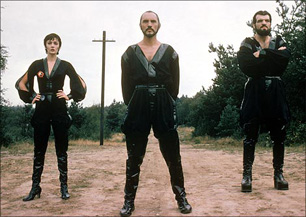Chapter Two: Superman II
By Brett Ballard-Beach
January 3, 2013
The glaring omission referenced above that plagues Lester’s film is the complete absence of Marlon Brando, who would only allow footage of him to be used with compensation of an enormous amount of the box office receipts. Thus, he is absent from the beginning recap and from any interaction with Superman later on in holographic form at The Fortress of Solitude. This robs Lester’s film of the emotions evoked and the closure allowed by Superman’s final conversation with his father in Donner’s version.
Much of the new footage shot by Lester expands upon Lois and Clark’s antagonistic relationship before she discovers his identity and in the moments after they have implied superhero/mortal sex. Their relationship takes the place of the missing Superman/Jor-El one and it becomes genuinely affecting in its arc (his rejection of his powers to be with her, his giving up of the relationship in order to regain his powers and combat Zod, Ursa, and Non, and their final scene where he wipes her memory with a kiss). The tradeoff is that in the new footage, Lois’ character has become unexplainably hostile to Clark, more combative, and generally less pleasant. It’s a complete about face from her character in Superman. In Donner’s version the footage he shot retains the “old” Lois but it also ups the speed on their relationship cycle to the point where it all clips by too quickly and any emotional heft gets sidelined.
In general, this haste is one of my two major quibbles with Donner’s cut and it may just be an irresolvable issue forged by the (understandable) determination to use all of his footage and (equally understandable) determination to use as little of Lester’s as possible. The epic destruction waged by the three villains has been severely curtailed, and in the process, rendered less campy, but those extended sequences of mayhem were exhilarating for me, particularly the one in Metropolis, because they drive home the point that since the trio have all the same powers as Superman, how can he defeat them?
But in answering that, I must confront my biggest problem with the series (and by extension the character): Superman is so . . . super, and aside from one (admittedly large) Achilles heel, he is indestructible, capable of almost anything. His doubts about his worth and about the life he must lead, in essence his humanity, are, in my opinion, the most interesting thing about him. He is not, however, as many superheroes are, fucked up, to any large extent.
“Truth, Justice, and the American Way.” There’s a reason that is the holy trinity he upholds by choice. From a dramatic angle, this limits what can be done with his character. The first two films (with some allowances made for the Superman vs. Evil Superman subplot of Superman III) effectively exhausted his repertoire. Now, there are a plethora of other villains he can fight (although I could not tell you any of them) and he can continue to have his doubts, but… what else is there? The forces behind the first two films admit as much by having Superman spin the Earth back in time to save Lois Lane, a trick so nice it is repeated at the end of Donner’s cut, to render the entire pitched battle moot (and to leave Lois clueless once again as to Clark Kent’s secret identity.)
Continued:
1
2
3
4
5
|
|
|
|




